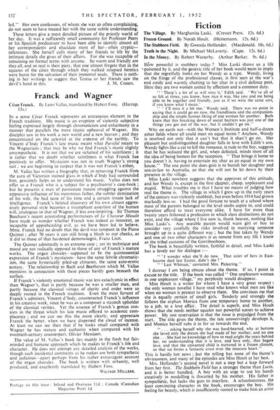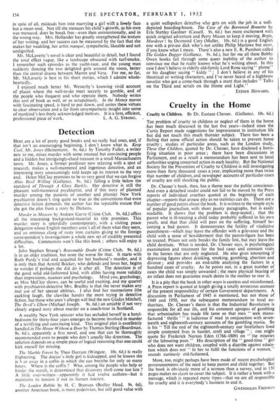Fiction
Him powerful is snobbery today ? Miss Laski shows us a life ‘poisoned by it, and- the generic title of her book would seem to imply that she regretfully looks on her Wendy as a type. Wendy, living on the fringe of the professional classes, is first seen at the war's end cosily and warmly chatting to her char in a civil defence post. Here they are two women united by affection and a common duty.
" TherF's a lot of us will miss it,' Edith said. ' We've all of us felt at times, you know, how nice it was, like you and me being able to be together and friendly, just as if we were the same sort, if you know what I mean.'
" I'll miss it a lot too,' Wendy said. There was no point in saying that it could go on now, the friendliness and the companion- ship and the simple human liking of one woman for another. Both knew that this breaking down of social barriers was just one of the things you got out of the war, but it couldn't go on."
Why on earth not—with the Women's Institute and half-a-dozen other fields where all could meet on equal terms ? Anyhow, Wendy is resolved not only that it can't but that it shan't go on. Her pleasant but undistinguished daughter falls in love with Edith's son. Wendy fights like a cat to kill the romance, is rude to the boy, suggests that he has seduced the girl, and, when defeated, minds most of all the idea of being hostess for the reception. " That brings it home to you doesn't it, having to entertain my char as an equal in my own house." The one point she does gain is to banish her daughter and son-in-law to Australia, so that she will not be let down by their presence in the village.
Miss Laski nowhere suggests that she approves of this attitude, and her Wendy is, except in the first chapter, cheap, unpleasant and stupid. What troubles me is that I have no means of judging how real the theme is. The village in which I grew up in the early years of the century was violently snobbish, but even before 1914 had grown markedly less so. I had the good fortune to teach at a school where most of the parents belonged to the level snobs aspire to, and could therefore afford to treat everyone alike. I have for more than twenty years followed a profession in which class distinctions do not exist, and the village where I live now is, thank heaven, nothing like Miss Laski's. Any sensible parent would warn girl or boy to consider very carefully the risks involved in marrying someone brought up in a quite different way ; but the line taken by Wendy and one or two other characters is as remote from any life I know as the tribal customs of the Gorribooboos.
The book is beautifully written, faithful in detail, and Miss Laski has a lovely ear for dialogue :— " • I wonder what she'll do now. That sister of hers in East- bourne died last Easter, didn't she ? '
" Last Whitsun,' corrected Mrs. Pickering."
I daresay I am being obtuse about the theme. If so, I point in excuse to the title. If the book was called" One unpleasant woman in one unpleasant village," my perplexity would disappear.
Miss Hoult is a writer for whom I have a very great respect : the only woman novelist I have read who knows what men are like when no woman is present to observe them. She convinces me that she is equally certain of small girls. Tenderly and strongly she follows the orphan Monica from one temporary home to another, to a job, to a love affair. The detail is superb, and Miss Hoult shows that she needs neither squalor nor powerful scenes to achieve power. My one reservation is that the issue is prejudged from the start.. The title gives the theme, the tale unswervingly develops it, and Monica herself rubs it in for us towards the end, asking herself why she was hard-hearted, why at bottom she loved only the dream she had made of her mother, and no one else .. . She had no knowledge of how to read aright the years behind her, no understanding that it is love, and love only, that begets love, and that the unwanted child is nurtured in a frozen climate, so that ice forms a fantastic crust over the insecure heart."
This is hardly hot news :,but the telling has none of the theme's obviousness, and many of the episodes are Miss Hoult at her best. Mrs. Hollander's second novel is not a step but a leap forward from her first. The Stubborn Field has a stronger theme than Lucia, and it is better handled. A boy with an urge to use his hands creatively in modelling is thwarted by his mother. His father is sympathetic, but lacks the guts to interfere. A schoolmistress, the least convincing character in the book, encourages the boy. His feeling for beauty, which is insufficiently rooted to make him an artist in spite of all, misleads him into marrying a girt witlra..lowl- y face but a mean soul. Not till she menaces his child's-irowth, as his own was menaced, does he break free—even then unintentionally, and in the wrong way. Mrs. Hollander has greatly strengthened the texture of her writing, and her success can be measured by the fact that she makes her weakling, her artist manqué, sympathetic, likeable and not undignified.
Mr. McLaverty's novel is clear and beautiful in detail, but I found the total effect vague, like a landscape obscured with turf-smoke. I remember such episodes as the yacht-race, and the young man suddenly dancing the two delighted girls around the room, better than the central drama between Martin and Vera. For me, so far, Mr. McLaverty is best in his short stories, which I admire whole- heartedly.
I enjoyed much better Mr. Westerby's knowing vivid account of places where the well-to-do meet secretly to gamble, and of the people who frequent and who operate them. Nobody writes this sort of book as well, or as scrupulously. In the Money moves with fascinating speed, is hard to put down, and unites these virtues to clear observation and a far from unsympathetic insight into some of mankind's less freely acknowledged motives. It is a firm, efficient,



































 Previous page
Previous page